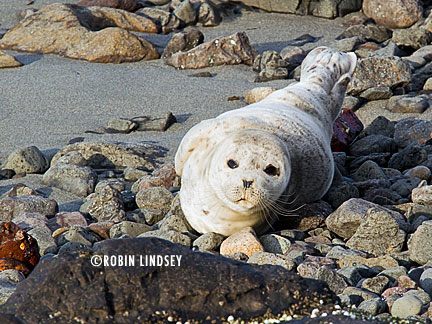Sunny day brings seal pup Cloudy to the beach
Nov/09/13 11:01 AM

While setting the perimeter, a quick call was made to Lynn S, scheduler for the day. She immediately consulted our online volunteer calendar and called those who had entered time for the late afternoon and evening hours. Shortly thereafter, volunteers Lars, Betty and Ralph showed up for duty with their binoculars and educational materials - ready to protect the pup and educate the public about harbor seal behavior. Next, came Angela and her 9-year-old son Jack eager to help out. The youngster named the pup Cloudy.
Volunteers Theresa, David and Eilene stayed until well after dark. Cloudy returned to the Sound at almost 8 o’clock when the high tide washed over him. The pup was beginning to shiver by that time in the cold air with damp fur. Since weaned pups tend to be on the thinner side with less of a blubber layer to keep them warm, it would be the equivalent of a person being out in the cold with a windbreaker instead of an insulated down jacket.
Cloudy hasn’t shown up yet today, but may reappear this afternoon after a late-morning high tide in excess of 12 feet. Angela reports that Jack woke up early this morning and the first thing out of his mouth was “I wonder if Cloudy came back to the beach?” We certainly hope so - and rest assured that if he does return, volunteers will be protecting him on these busy urban shores.
While scouring the shoreline for signs of pups early this morning, our first responder noticed some derelict net caught in the rocks below the sea wall. We will attempt to remove that today so that this treacherous piece of marine debris can no longer endanger marine wildlife.
UPDATE 2:00pm
Using a rope ladder, first responders Robin and David scaled the sea wall and cut away a substantial piece of “ghost net” that was lodged between the rocks and high cement wall close to where Cloudy rested yesterday. This term refers to a derelict fishing net - a deathtrap that has been lost or cut free by fishermen which drifts through the water, catching and drowning marine wildlife.
If you come across derelict fishing gear, you can report the type and location online through Northwest Straits Initiative’s website here. Countless thousands of marine mammals, sea turtles and sea birds die each year in derelict fishing line, pots and nets. In Puget Sound alone, as of late September, 2013, the Northwest Straits Initiative has “removed 4, 527 derelict fishing nets, 3,081 crab pots and 47 shrimp pots from Puget Sound. More than 323, 000 animals (240 unique species) were found entangled in this gear.” We applaud their tremendous - and often perilous - environmental work.







